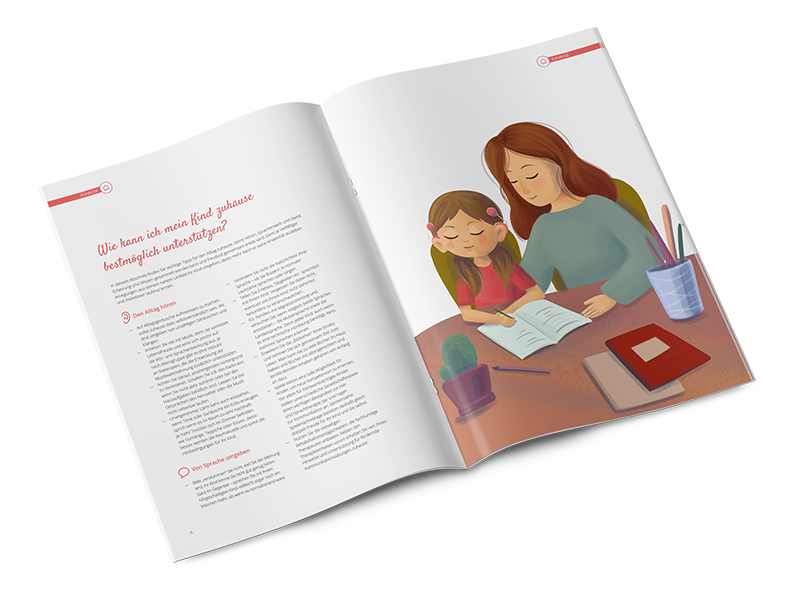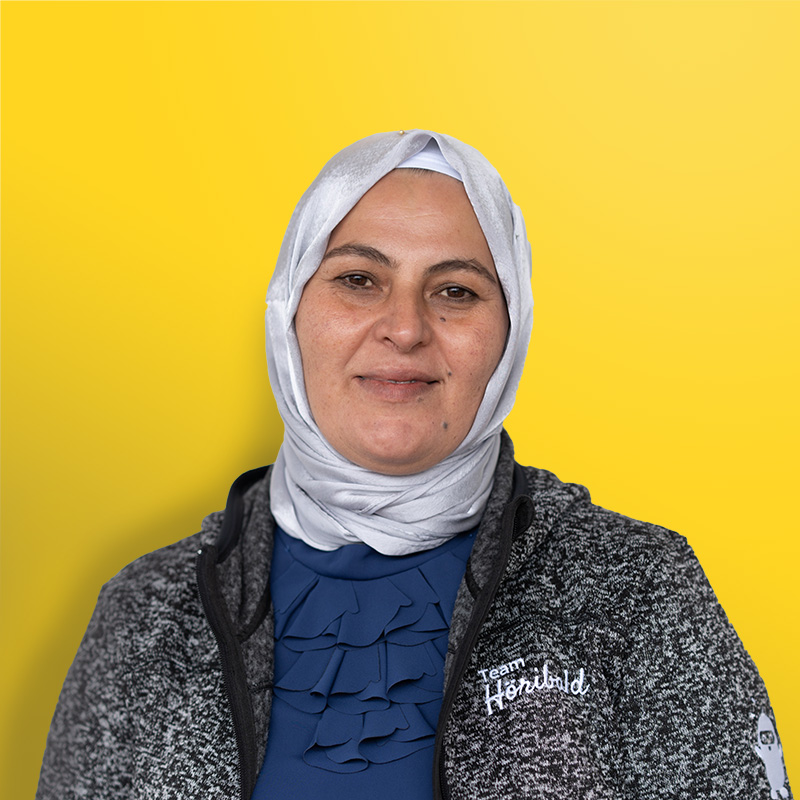Education


Education
Everything about development and learning with hearing impairment
A child learns language whilst gathering life experience and extending his or her knowledge of the world. This happens in the early years in the safe context of the family, then in the nursery and until adulthood in school and training.
The effectiveness of language learning thus depends significantly on the framework conditions determined by the adults. Language acquisition, and with it the acquisition of experience and knowledge, will be more successful if your child can express creativity and all that which makes being human what it is with a great variety of stimuli in its immediate environment.
If language acquisition is made more difficult for your child through a language impairment or even deafness, encouragement from you as a parent, as well as the educational institutions, is hugely important, together with medical and technical provision.
You can find some useful tips here about how you can best support your child at home with language and what you should be aware of when choosing an educational establishment!
On this page you can find
I believe that education
must have love as its aim.
Astrid Lindgren
A checklist for everyday life with the family
Discover hearing
Make your child aware of any sounds that you hear. Try to describe them. At home, at the zoo or on the playground – we are surrounded by countless noises and sounds.
- Work with music often because this brings joy, and has a positive effect on hearing and language development. Depending on the age group, there is a lot of material which can give additional support in the development of music perception.
- If your child should repeatedly refuse to wear the audio processor, that could have causes that you should be aware of or that can be easily solved: For example, make sure at the fitting appointments that the current settings are comfortable for your child. It could be that one of the chosen audio processor magnets is too strong and creates an unpleasant pressure point. Children often feel parental pressure to succeed or, conversely, use refusal as a way of pressurizing parents. In summary – if the audio processor is well-adjusted, and with the right framework conditions, your child will definitely recognize the benefit to be gained from the new ability to hear.
Surrounded by language
 Please, do not “fall silent” because you think your child cannot hear you well enough. Quite the reverse – speak to your child with hearing impairment, maybe even a little more than you would a normally-hearing child.
Please, do not “fall silent” because you think your child cannot hear you well enough. Quite the reverse – speak to your child with hearing impairment, maybe even a little more than you would a normally-hearing child.- Don’t change the natural way you speak – whether you are whispering, speaking at normal volume or singing.
- Conversely, listen to all the sounds and linguistic expressions your child makes. Your child needs to understand the effect of his or her language as a means of communication.
- Share experiences and activities with your child by using language. Do not forget to illustrate or demonstrate anything your child may not have heard.
- For families with a migration background: try, if possible, to offer both languages, mother tongue and the national language. Every child, even if he or she has a technical hearing solution, can learn several languages.
- Keep a record of your child’s experiences in a diary that you can look back at any time. Your child can show the diary, with pictures, drawings and writing, to others and so tell them about what he or she has experienced, even if the language is somewhat delayed due to the hearing impairment. Apart from that, the diary will be a wonderful memento of childhood later.
- Play role-plays with your child! Amongst other things, that promote the skill of empathizing with other people. You child takes on the character, so-to-speak, of the other person and so perceives the world from a different viewpoint.
- Extend your child’s “library” and spend time reading (aloud) together. You can never have too many books in your house. Especially the books with age-appropriate and educational content should be there from the start.
- Sing to your child as often as you can! And do not be surprised if one day your child tries to imitate you. That could be one of the great moments in the first years of hearing.
Virtual learning
If necessary, online lessons are already in use in elementary school. An optimal environment at home and safe use of technology will allow your child to participate in this modern classroom form without any problems. With following tips, you can help your child achieve better results with learning:
- If possible, create as quiet surrounding as possible for your child to study at home.
- Separate this area from the play area or remove all play items before class begins.
- For a good online connection, it is recommended to sit close to the WLAN router.
- During class, other family members should reduce the internet use to avoid connection problems.
- The screen should be as big as possible, which means that ideally PC, Laptop and Tablet should be used, instead of cell-phone.
- Find out what technical options your child’s audio processor offers for coupling the audio output of the computer as directly as possible into the hearing system. Depending on the audio processor, audio cables, induction loops orAudioLink can lead to significantly improved sound quality and thus effortless listening and better understanding.
- Help your child become familiar with the technical capabilities of the online platform used by the school, such as:
- Where can you make the teacher’s picture bigger to see the image of the mouth well?
- Is there a “subtitle” function?
Necessary checks
 Check the function of your child’s hearing system every day, as he or she may not yet be able to draw your attention to a fault.
Check the function of your child’s hearing system every day, as he or she may not yet be able to draw your attention to a fault.- Have your child’s hearing tested regularly via hearing test – usually by the language therapist.
- Take up the regular service appointments at the educational audiologist or service-team of the hearing system manufacturer.
Regarded with love
 Encourage your child’s creativity and independent activity; in this way, they get to know themselves better.
Encourage your child’s creativity and independent activity; in this way, they get to know themselves better.- Maintain regular contact with other families for whom hearing impairment is an issue, or persons with hearing impairments themselves. New pathways of acceptance open up to you through them .
- Never forget loving affection, especially direct physical contact. This gives your child certainty of your love and affection.
- Never give up, stay patient if your child is not yet making the progress you wanted.
- Remember: your child can do the same as a normally hearing child, some even better, if he or she is given the chance!
- Take time for yourself regularly so that you can recharge yourself for everyday life in your family.
- Please do not compare your child with the ability of other hearing impaired children of the same age. Each affected child develops in their own way at their own pace due to different life structures.
- Try not to treat your child differently than hearing children. Your hearing impaired child also needs clear rules and boundaries to be able to express his or her own needs appropriately and feel secure in the family surroundings.
- And never lose sight of this: you have not just taken on a difficult and demanding task, you also have wonderful goal to aim for: you can support your child on the path to hearing and so to a normal, self-determined life.
Children should get two things from their parents
– roots and wings.
Johann Wolfgang von Goethe
In kindergarten
New and exciting years begin for the child in the nursery – at the same time though, it is a farewell to the time of complete security and intensive proximity to the family.
That means a great change for all those involved, together with the choice of the best nursery for your child to attend for the next few years.
“A childhood is not a competition for how quickly a child starts to speak, read or write. Childhood is a small window of time for learning and development at the right pace for each individual child.“
Magda Gerber
The right choice
Whether a regular nursery or a nursery establishment with special educational facilities tailor-made for the child is chosen depends on several questions that the parents have to ask themselves in the decision process:
- How well-advanced is my child’s hearing and language development?
- What is the advice from the supporting therapists and early years hearing support?
- Is additional support needed in addition to the nursery provision?
- If yes, does my child need further support measures beyond hearing educational facilities?
- What nurseries are there with good facilities near where we live, so that my child/the family will not have long travel times?
- How big is the nursery group in the nursery of our choice?
- What educational concept does the nursery use and can we introduce that to our child?
- How high are the monthly fees?
Where and whether you child will ultimately feel comfortable mostly depends on your intuition. Together with the possibility of using other necessary educational measures, your own feeling for the right nursery place is at least as important.
A hearing impairment is not a criterion for exclusion from acceptance in a public or private regular nursery. The hearing impairment should be discussed openly when registering your child at the nursery, so that the right support can be applied for in advance. Children with hearing impairments are often placed with nursery teachers with special training (speech therapy, early support, etc.). Some of these might be peripatetic educators who are not permanently in nurseries.
Why nursery is so important
Children grow up gradually in the nursery; these years, together with your nurturing, are of huge importance for the best development of your child, even if he or she had no impairments.
A few examples of why the nursery years have an important place in the life of your child:
- Having friends in both adults and other children
- Taking on tasks
- Completing tasks together
- Slipping into different roles
- Discover new things and experience awe and wonder
- Expressing themselves in pictures
- Listening and understanding
- Feeling comfortable in a group
- Perception with all senses
- Dealing with hazards
- Daring to do something
- Trying hard and achieving something
- Having adventures
- Having an idea and carrying it out
- Being able to communicate
So you see, key qualifications for later life are acquired in this time: from behavior patterns, practical learning skills, first knowledge of the world to important emotional experiences outside the family environment.
As this is also the case for children with impairments, the choice of the right nursery place is one of the very important decisions for you as parents.
Every child has the right to learn, to play, to laugh,
to dream, to love, to have a different view,
to progress and to realize their potential.
Hall Dennis Report
School time
“We as teachers and experts also have an advisory function, of course, but ultimately it is the parents who choose the method of education for their child.“
Katharina Strohmayer, BIG Direktion
![]()
School is just around the corner – these next years are not just about acquisition of knowledge, your child is permanently shaped for the future by those around them – teachers and school friends. Nothing will prevent successful and happy schooling for your hearing-impaired child, if you, as parents, have made the right choice of school.
You can find some tips and information here about how your child’s school time can be very successful!
Useful information about starting school
As for all other children, children with implants have to learn to deal with school routines as best as possible. To do this, they rely on the support of teachers and parents.
Whatever form of school you choose for your child, it is always advisable to contact the school leadership and the teachers responsible in advance and get to know them. Not everyone is familiar with cochlear implants and they are still often confused with hearing aids. For some children with a CI, the audio processor disappears completely under their hair, and the teacher may no even be aware that a child who acts like a normally-hearing child with the CI will not hear at all without it. A personal conversation can answer some questions and also clear up any uncertainties.
You have an important role in coordination of aids and information, particularly if you have chosen individual integration of your child, especially as the school concerned might not yet have any experience with individual experience in general or with this disability specifically.
In short: early information exchange with the school smooths the path to an untroubled and successful time in school for your child.
Different options for schooling in primary school (elementary school)
It is your wish to lay a good foundation for a successful school career for your child. The choice of the right form of school is thus of particular importance for you as parents/guardians.
In Austria, a variety of forms of school is basically available to hearing-impaired children. Depending on where you live and in consideration of the needs of your child, you can choose from the following models:
Mainstream school class
Your child can be educated in a mainstream school class local to you in the context of individual integration. The mainstream school teacher then takes the hearing impairment into account. A support or additional teacher will then come into lessons as needed. This teacher will support your child in lessons, give individual tuition or advise the staff at the mainstream school on particular issues of teaching and testing.
How many hours of support your child will receive varies between states and of course depends on special educational needs – there are various models, stretching from one visit per school year to several hours a week. Applications for support teachers involve experts in hearing either via the school leadership or directly at the education offices of the state concerned.
The parents of individually integrated children have an important role in explaining the child’s individual situation, especially as the school concerned may not have any experience of the particular disability or the method of individual integration.
Although with early and optimal hearing care there is a very good chance that your child will be able to meet the challenge of individual integration, when your child starts school you should again make sure that his or her hearing and speech development is sufficiently developed for one-to-one integration, as this way frustration and some other problems in future can be minimized.
Inclusion class for children with various special educational needs (successor model of the integration class)
When people speak of inclusion classes, they usually mean general integration, in which two teachers support four to six children with various support needs in a class together with other children without disabilities, where one of the teachers is trained in general special educational needs.
Inclusion classes contain fewer students than mainstream school classes in the same school phase. The lower number of students and the constant support are advantageous to the children affected. However, the type of the needed support will be quite different for different disabilities. There is also the danger due to possibly insufficient resources, that not enough attention is given to your child’s hearing impairment.
Even in inclusion classes there could be a claim to an additional, hourly-appointed support teacher, if the special education teacher has no specific experience with hearing impaired students.
Inclusion class with a focus on hearing impairments
The class size for hearing impairment inclusion classes is reduced to 18 – 20 students, which improves the acoustic conditions in the classroom. For four to six hearing-impaired children – which is about one-third of the students – the regular school teacher is assisted by a special teacher for hearing-impaired in all lessons. Additionally, the hearing-impaired students receive individual and group language support and listening units each week.
One reason for choosing his form of school is the possibility that hearing impaired students will receive lessons together with hearing students as a “peer group” with a strong inner solidarity. This enables these children to interact with other hearing-impaired students, which strengthens their self-confidence and promotes their personal development. There are beneficial stimuli from lessons with hearing children which promote the social and linguistic development of children with hearing impairment.
On the other hand, this form of school is recommended to those children who are striving for individual integration, but at the time of entering school, are not yet sufficiently prepared or consolidated linguistically to meet that challenge.
This type of intensive class with hearing and hearing-impaired students and two teachers can be offered both at a specialized hearing loss institution (preventative inclusion) or as a branch class at a mainstream school.
Small classes for hearing-impaired students
Alternatively, students with hearing impairments with additional needs in some federal states (Vorarlberg, Tyrol, Salzburg, Upper Austria and Vienna) have special classes for 4 to 8 children available at institutions for people with hearing impairment, where they are taught with individual support concepts and where additional therapy provision such as language therapy, physiotherapy and psychology is available.
Middle and upper schools
Secondary Phase I
Secondary Phase I includes the General Secondary School, Cooperative or New Middle School, the Higher General Education Lower Stage, Polytechnic, Vocational School.
As long as your child is still of compulsory school age – up to 9th grade, that is, to the age of 15 – the same options are fundamentally open to him or her as in the primary school phase.
After the end of compulsory schooling, your child has the choice between an apprenticeship or further education.
Secondary Phase II
Secondary level II comprises the upper level of general secondary schools (AHS) as well as vocational schools, such as the commercial academy (HAK) or the higher technical school (HTL), and concludes with the Matura.
Support teachers for middle and higher schools:
The support teacher system for individually included hearing-impaired students in state schools is regulated differently in different states. The number of hours depends on resource allocation of the respective education authority. The respective contact person (see contacts) in the state concerned or the head teachers of the hearing-impaired institution will give information about the procedure for applying for allocation of support hours and about the weekly number of hours.
Generally, up to four hours a week are available for support teachers in the federal schools. The application is made to the relevant education authority via the head teacher of the school attended.
Agreements for hearing impaired students (e.g. cancellation of listening exercises, time extensions for school tests, agreements on the school leaving certificate) must also be made to the relevant education authority via the head teacher of the school attended.
In the Secondary Phase II, an application for the deployment of a written-/Austrian sign language interpreter (generally per class with at a maximum seven hours a week) can be made by the school to the federal ministry for education, science and research (bmbwf).
Vocational training school, apprenticeship
There is an obligation up to the age of 18 in Austria to be in some form of education or training, which a hearing impaired young person can take up at either a further education school or as part of vocational training. If a further course of training is completed before the 18th birthday, this obligation ends, including for young people with disabilities. Depending on ability and availability, young people can complete their obligatory education in a regular apprenticeship, an apprenticeship with partial qualification, a cross-vocational training or in a so-called daily structure.
An apprenticeship is a training following compulsory schooling in a trade, agricultural or commercial area.
The initiative https://www.neba.at/ provides support in learning about the various training possibilities and finding your way around the job market better.
Tips for lessons
“Through early provision at a kindergarden age, the language development dependent on hearing is positively promoted. Good hearing and language knowledge later contributes to being able to keep up in school better.”
Prof. Joachim Müller, MD, University Clinic Munich
You can only keep up in school if you can hear well in lessons. Children and young people who have hearing impairments and have been fitted with hearing implants and who attend a regular school can also do this – if the framework conditions are right.
In case the school is not familiar with the issue – you can find a series of tips here that you should discuss with the teaching staff or the school leadership to create the best conditions for your child:
Framework conditions in the classroom
So that a child with hearing loss and a hearing implant hears as well as possible, it is important to design the classroom so that it has the shortest possible reverberation time and few sources of background noise.
Here you can find a list of actions that could support your child in this respect:
-
- Noise insulating ceilings shorten the reverberation time, curtains and blinds absorb noise.
- The affected child should sit as far forward as possible in order to have direct eye contact with the teacher and classmates.
- Avoid ambient with the right floor texture
- A seat on the window side also prevents glare and ensures a better overview.
- A rotating chair makes it easier for the child to turn quickly to the source of a sound or the person speaking.
- Interfering chair noise can be avoided with rubber fittings on the chair legs or with carpeted floors.
- Sitting next to a quiet classmate and being as far as possible from louder students can also be of benefit.
- In general, using an FM system is also helpful – with this, a mini transmitter carries the teacher’s voice directly to the child’s audio processor and makes understanding easier in noisy backgrounds.
- A class microphone can transmit classmates’ comments and inputs.
- A class loudspeaker, so that teacher and classmates can be more easily understood (see the new Roger system by Phonak or similar)
- A so-called Smartboards/Whiteboards , for example: to illustrate the subject matter or a page from the Internet
- Written language interpreters or classmates as mentors, who take notes for the hearing-impaired child when there is particularly material-intensive lesson content
If the school does not already have this various additional technology, such as FM-systems, smartboards, acoustic solutions etc., you can discuss acquisition of these with the school board.
Guidelines for teachers
Active didactic support by the teacher is indispensable for children with hearing impairments. You can find some useful tips here which can improve communication between the teacher and the child :
-
- Speak rhythmically and clearly
- Give more visual support with content, for example with a smart- oder whiteboard (successor to the overhead projector or data projector), so that images can be brought up faster by internet
- Write the subjects to be covered on the blackboard/whiteboard
- Write deadlines and homework tasks on the blackboard/whiteboard
- When using audio recordings, provide the text to read along
- Explain the content of films briefly before showing them
- Allow and encourage the child to ask questions
- Remove the processor or use WaterWear for swimming lessons
- Be careful with ball sports (impacts could damage the implant)
Tasks of the support teacher for older children and young people:
(Support in lessons or in an individual setting)
-
- Information about “hearing impairment” for the teachers, for other students and if necessary for the parents/carers
- Mediator between parents, students, head teacher, youth coaching for hearing impaired persons
- Increasing self-confidence /dealing with the hearing impairment
- Note-taking and visualization of lesson content
- Word explanations, explanation of technical terms and foreign words, word processing
- Preparations and follow-up work
- If necessary: Use of Austrian sign language
- If required: Articulation exercises/ hearing training
You can find further tips on the subject at endlich-wieder-hoeren.org
Gratis Download: Ratgeber für Lehrer
Online lessons:
In many school areas, it is not only in special situations that lessons are conducted online. This requires creativity in lesson planning on the teacher´s part, but also the application of a few rules to make this form of instruction accessible to hearing-impaired children. Here are the series of recommendations for teachers on how to make virtual learning work for everyone!
-
- For a successful online class, it can be useful to divide the class into small groups and to limit the common working time sensibly.
- Good audio quality is a basic requirement in online teaching and promotes attention.
- Only one persone talks, all others turn off their microphones
- In case of comments or questions, the “Raise hand” and “Chat” functions help.
- Pre-agreed “rules of the game” encourage students to actively participate.
- For small group discussions, there is a “break room” or “outbreak room” function.
- If all students are to contribute to the respective conversation, “passing the microphone”, for example, has proven effective. When a student finishes speaking, he or she names the next speaker.
- To enable hearing-impaired students to lip-read online as well, the teacher – and, in the case of lengthy verbal comments, the respective student – should turn on the video function.
- A well-lit room with a solid color background, looking directly into the camera and avoiding shadows could be helpful.
- However, all others should turn off their camera to reduce the transmission capacity and thus avoid dropouts for students with weak Internet connections.
- If the sound quality is still poor for individual speakers, the teacher can repeat what is said or rephrase it.
- Visual aids are somewhat easier to use online. Illustrative objects can be shown using a video camera, and graphics, images and texts can be shown via “screen sharing”.
- Files, important data or work orders can also be uploaded in the chat and remain available there permanently.
- On the videos, there is a possibility of “subtitles”.
- With teacher´s consent, students with hearing impairment can use the recording function to watch the lesson for the second time.
- Teachers may also record their lecture on their own and provide the recording to the students involved.
- Those who are used to a written interpreter do not have to do without one online.
Compensation for disadvantage in class, schoolwork and exams
It is important that the expectations of the teacher are adjusted to the situation for the hearing-impaired child and, most of all, are realistic. In order to make teaching as fair as possible, measures for compensating for disadvantages were considered together with the Ministry of Education.
Here are the most important measures that could be requested from the education directorates via the respective school management, if needed:
-
- Increased time for school tests: 15 minutes for a 1-hour test, 30 minutes for two-hour tests
- Explanation of content before and during the school tests by the teacher
- Use of special equipment (e.g.: definition dictionary)
- Use of a replacement text for listening tasks
- Reading instead of Listening comprehension in foreign language tests
- Presentation, projects or creative extra tasks instead of oral tests
- Presence of a teacher of the hearing impaired during final examinations

Eltern- und Lehrerratgeber: Entwickeln und Lernen mit Hörimplantat
Entwickeln und Lernen mit Hörimplantat is a two part guide for parents of children with hearing implants, as well as their teachers. This comprehensive information brochure should help parents as well as educators to provide the affected child with the best possible support through the school years.
Contacts
Nursery
You can find the contact details for the relevant office in the City of Vienna here: www.wien.gv.at/kontakte/ma10
For Information about nurseries and responsibilities in the other states, please contact the town hall/ community offices of your home.
Schools
You can find the correct contact person in your state for questions of the correct choice of school for your child here:
Persönlicher Kontakt zu Betroffenen
Die Möglichkeit, mit anderen Familien und NutzerInnen direkt in Kontakt zu treten, ist gerade am Anfang dieser besonderen Reise mit Ihrem Kind unermesslich wichtig für betroffene Eltern. Hier finden Sie persönliche Kontakte, die sich gerne für unsere Website als BeraterInnen und zum Erfahrungsaustausch zur Verfügung gestellt haben – denn Hören verbindet!















